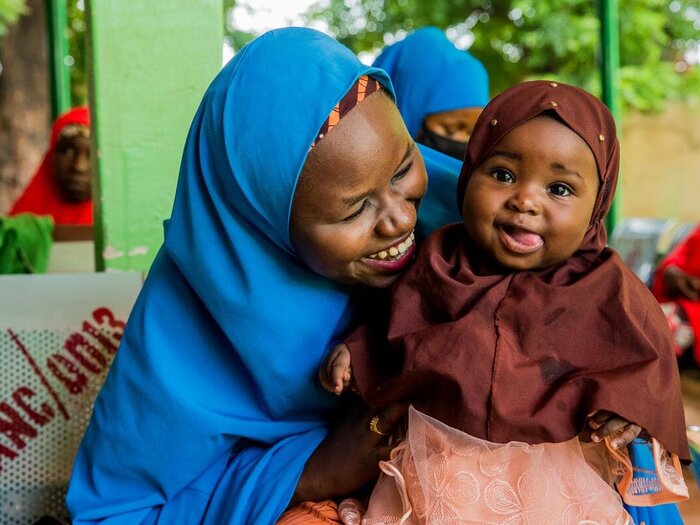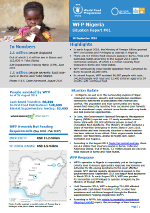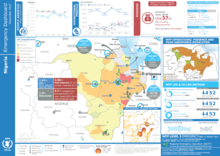Nigeria
- 4.4 million
- people are food insecure in northeast Nigeria
- 37%
- of people nationwide live below the poverty line
- 2.2 million
- people internally displaced in Borno, Yobe and Adamawa states
With over 220 million people, Nigeria is the most populated country in Africa and the sixth in the world. It is the tenth-largest producer of crude oil in the world and achieved lower-middle-income status in 2014. However, around 84 million Nigerians, representing about 37 percent of the total population, live below the poverty line.
Conflict and insecurity, rising inflation and the impact of the climate crisis continue to drive hunger in Nigeria – with 26.5 million people across the country projected to face acute hunger in the June-August 2024 lean season. This is a staggering increase from the 18.6 million people food insecure at the end of 2023.
Conflict in the North East region has displaced 2.2 million people and left another 4.4 million food insecure in Borno, Adamawa and Yobe states. Three million of them are in Borno State, the epicentre of insurgency. Nigeria is subject to periodic droughts and floods. This has had an adverse impact on agricultural output and increased the vulnerability of populations, especially in rural areas.
Insurgent activities have added pressure to a fragile resource environment, deepened insecurity, hampered development, and heightened the food and nutrition insecurity of vulnerable women and children.
The World Food Programe is prioritizing its operations to reach 1.1 million vulnerable people every month in northern Nigeria. Those receiving assistance include displaced people living in camps or host communities, as well as vulnerable members of host communities and people returning home after months of displacement.
What the World Food Programme is doing in Nigeria
-
Food assistance
-
WFP uses either food or cash transfers to support displaced people living in camps or with host communities, as well as vulnerable host populations. With diminishing resources, WFP is prioritizing its operations to reach 1.1 million vulnerable people every month in northern Nigeria.
-
Nutrition
-
WFP provides specialized nutritious food to children under 5 at risk of malnutrition, and pregnant and to nursing women. Jointly with UNICEF and NGO partners, WFP delivers essential health and nutrition services to prevent and treat acute malnutrition. Surveys in camps for internally displaced people in Borno State show a significant drop in malnutrition rates among the population supported by WFP and other humanitarian agencies. However, overall malnutrition figures remain very high, especially in the more remote, conflict-affected areas in the northeast.
-
Resilience
-
In collaboration with the Government of Nigeria and other partners, WFP is implementing livelihoods programmes and income-generating activities. We give cash to people in the short term, while providing training so displaced people can acquire skills and employment in the long term, in areas such as food processing, aquaculture, vegetable gardening, tailoring and carpentry.
-
Capacity strengthening
-
WFP provides capacity strengthening for the Government, helping to develop and strengthen policies and national strategies, provide technical support for Africa’s largest nationally owned home-grown school feeding programme, and institutionalize shock-responsive social protection – starting with pilots in northwestern states.
-
Logistics
-
The Emergency Telecommunications Service (ETS) provides internet connectivity in eight field locations. In Damasak, northeast Nigeria, the ETS is upgrading the UniFi devices – the internet access point – to the latest version so that humanitarian workers can use enhanced ETS services. Overall, ETS provides internet connectivity to 3,000 users from over 90 organizations, including many United Nations agencies and NGOs across northeast Nigeria.
-
UN Humanitarian Air Service
-
WFP provides air transport to the entire humanitarian community, including helicopters to carry vital relief – vaccines, medicine, medical equipment and staff – to hard-to-reach, isolated areas. The United Nations Humanitarian Air Service (UNHAS), managed by WFP, was transporting over 3,700 passengers a month by the end of 2023. UNHAS was also transporting 10.2 mt of light humanitarian cargo each month, reaching 14 locations. UNHAS passenger and cargo services support more than 80 organizations in Nigeria.
Nigeria news releases
Go to pagePartners and donors
Find out more about the state of food security in Nigeria
Visit the food security analysis pageOperations in Nigeria
Contacts
Office
Asokoro
Nigeria



